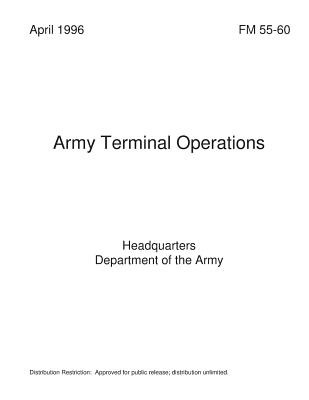
- We will send in 10–14 business days.
- Author: Department of the Army
- Publisher: CreateSpace Independent Publishing Platform
- Year: 1996
- Pages: 146
- ISBN-10: 1494864088
- ISBN-13: 9781494864088
- Format: 21.6 x 28 x 0.8 cm, softcover
- Language: English
- SAVE -10% with code: EXTRA
Reviews
Description
This FM deals with Army terminal operations in a TO. It contains procedures and techniques to plan, use, and control Army water, motor, rail, and air terminal operations. It explains the transportation doctrine and organizational structures needed to deploy Army terminal operations in a TO. It covers roles, missions, and concepts of employment for terminal operation units. This manual is mainly for unit commanders, key personnel, higher HQ staffs, theater planners, and commanders of operational allied units. Terminals are key nodes in the total distribution system that support the commander's concept of operation at all levels of war and through the range of military operations. They provide loading, unloading, and handling of cargo and personnel between various transportation modes. When linked by modes of transport, they define the transportation structure for the operation. Force projection missions require early identification and establishment of terminals. A well-conceived plan assures that terminals can support the deployment, reception, and onward movement of the force and its sustainment. Crucial to the execution of the operation is the assignment of the right personnel, cargo, and material handling equipment at each terminal. ITV of material moving through the transportation system also provides the CINC with information pertaining to location and final destination of all cargo. The Army is required to function across a range of operation from peacetime through conflict to war (see FM 100-5). Terminal operators must be able to operate in every TO. Terminals will be vulnerable to air and missile attacks, especially if US and allied forces have not established air superiority and sea control. They may also be subject to attacks by unconventional forces and to sabotage, terrorism, mining, espionage, and chemical or biological attacks. Whatever the level of the Army operation, terminals will remain a critical piece to ensure continuous movement of personnel and cargo.
- Author: Department of the Army
- Publisher: CreateSpace Independent Publishing Platform
- Year: 1996
- Pages: 146
- ISBN-10: 1494864088
- ISBN-13: 9781494864088
- Format: 21.6 x 28 x 0.8 cm, softcover
- Language: English English
This FM deals with Army terminal operations in a TO. It contains procedures and techniques to plan, use, and control Army water, motor, rail, and air terminal operations. It explains the transportation doctrine and organizational structures needed to deploy Army terminal operations in a TO. It covers roles, missions, and concepts of employment for terminal operation units. This manual is mainly for unit commanders, key personnel, higher HQ staffs, theater planners, and commanders of operational allied units. Terminals are key nodes in the total distribution system that support the commander's concept of operation at all levels of war and through the range of military operations. They provide loading, unloading, and handling of cargo and personnel between various transportation modes. When linked by modes of transport, they define the transportation structure for the operation. Force projection missions require early identification and establishment of terminals. A well-conceived plan assures that terminals can support the deployment, reception, and onward movement of the force and its sustainment. Crucial to the execution of the operation is the assignment of the right personnel, cargo, and material handling equipment at each terminal. ITV of material moving through the transportation system also provides the CINC with information pertaining to location and final destination of all cargo. The Army is required to function across a range of operation from peacetime through conflict to war (see FM 100-5). Terminal operators must be able to operate in every TO. Terminals will be vulnerable to air and missile attacks, especially if US and allied forces have not established air superiority and sea control. They may also be subject to attacks by unconventional forces and to sabotage, terrorism, mining, espionage, and chemical or biological attacks. Whatever the level of the Army operation, terminals will remain a critical piece to ensure continuous movement of personnel and cargo.


Reviews